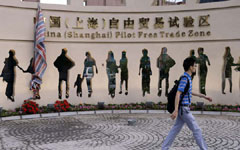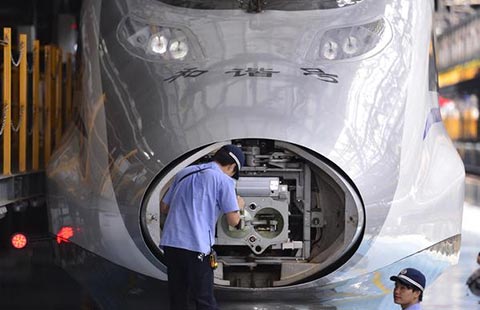Cross-border capital flow eased in Shanghai FTZ
(Xinhua) Updated: 2014-05-17 13:00Banks participating in the yuan trial said that it had gone very well and are pushing for a national policy of the same kind to benefit more firms.
While the foreign exchange trial will soon go nationwide, banks with branches in the free trade zone also expect the cross-border yuan trial to expand outside the Shanghai zone.
"Many firms we are speaking to have shown great interest in the cross-border yuan cash sweeping service and are eager to learn its details, but at this stage it is only available for companies that have a presence in the zone," said Kee Joo Wong, head of global payments and cash management of HSBC Bank China.
 |
 |
"But we believe it is very likely that the cross-border yuan cash sweeping pilot could eventually be rolled out for the rest of China, based on the successful implementation in the zone," Wong said.
Expanding the cross-border yuan trial is also in line with China's agenda to promote the global use of renminbi, which rose to be the seventh most used payment currency earlier this year, according to global transaction service firm SWIFT.
Standard Chartered Bank predicts that the yuan will rank only after the US dollar, euro and the British pound as the world's fourth payment currency by 2020, adding that 30 percent of China's trade by then will be settled in yuan.
Liu Linan, Deutsche Bank greater China rates strategist, said the growing acceptance of renminbi as a payment currency in international trade points to progress in promoting its use beyond Chinese borders, despite its recent depreciation against the greenback after China's exchange regulator widened its daily trading band to two percent on either side of the reference rate in February this year.
"We've made our core strategy around the yuan, with our strong overseas network and committed trading team to support yuan business on a global scale," Standard Chartered's Zhang said.
Authorities have taken a measured approach to loosening tight grips over China's financial systems in the free trade zone to ease capital flow while trying to hold risk at bay. These gradual measures underscore Shanghai's ambition to become a new regional treasury center after Hong Kong and Singapore. Doing that requires greater clarity in policy and realigning financial systems to international standards, according to HSBC's Wong.
He added that sound legal, regulatory and tax frameworks are vital to ensure confidence among investors and the city should continue to work to attract more qualified financial professionals to deliver treasury solutions to corporate clients.
"What we expect from regulators is a more streamlined process and less approval to go through, which has already happened in a lot of areas, not just in financial services, but also in business registration," Zhang said.
"For companies and banks, what they want most for financial services is the easier the better, the faster the better," Zhang said.
- China's Jumei soars on US market trading debut
- Investing in China boosts Italian companies: official
- BOC Aviation delivers leasing aircrafts to KLM Cityhopper
- China enhances regulation of interbank business
- GM to pay $35m fine for delaying recalls
- China to streamline vehicle safety inspections
- China allocates funds for air pollution control
- China's SOEs Jan-April profits up 6.5%















